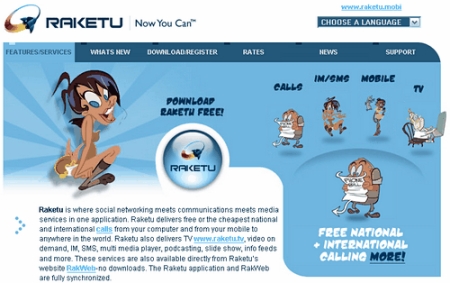The Mobile Technology Weblog
Location Based Services and all about Mobile MarketingYes, It is Possible to Call via SMS!
Yeah, I know the title is quite confusing but it is what it is – a new technology enabling mobile users to make VoIP calls just by sending a simple text message.
Raketu, leading edge peer-to-peer Internet protocol applications developer, has created an SMS-Text Driven VoIP Service called RakSMS calling, which enables mobile device users to make phone-to-phone voice over IP (VoIP) Internet calls with no computer or Internet connection required.

Unlike most mobile VoIP services available today, it does not need a GPRS connection to initiate a call. It means even a simple mobile phone can use this service. Here's an example to make matters clear:
A mobile phone user in the UK wants to call a friend in New York also on a mobile phone. The user in the UK sends a text message from their mobile phone to Raketu's UK local number with the appropriate calling information in the message and Raketu connects the two phones. The Raketu rate for the call will be the regular RakWeb calling rate, or $0.115 per minute.
Requirements: You must have Raketu account with credits. You can load your account with $9.95, $24.95 or $49.95.
Savings: Raketu claims mobile users can save more than 35% compared to Jajah's rate for the same call.
November 17th, 2007 at 10:22 pm
Hello,
I didn’t understand why we have to send a text message.. I think there isn’t a relation between sending a message and make a voIP.. If we can call cheaply, we need ability to call directly without sending a message..
November 18th, 2007 at 11:13 pm
Initiating a mobile call via text/SMS is really “call back” (where the service calls the person who sent the text msg: the caller, and the person (callee) who the caller is trying to call (presumably the callee tel# needs to be in the body of the text message. BTW, there are several companies, who provide this capability, e.g., http://www.fonemine.com who does so for consumer2business calls. The real question is does the caller tel# show up when the callee receives the call? (else how will the callee know who’s calling?). Also, such calls should really support access control so the callee can choose whether or not to receive the call (since in countries such as US, callees also pay for incoming calls). This is also supported by http://www.fonemine.com